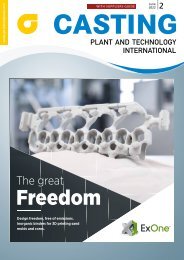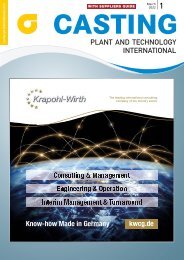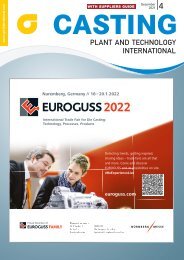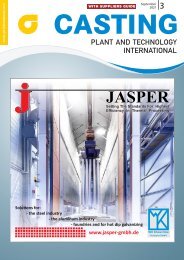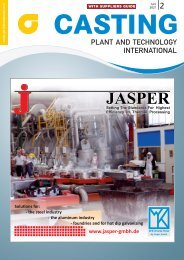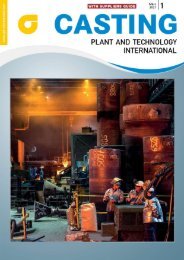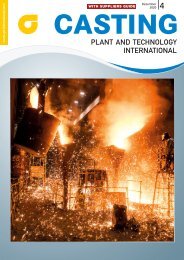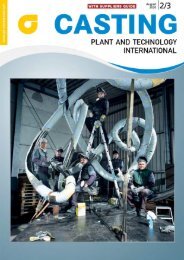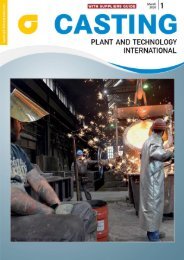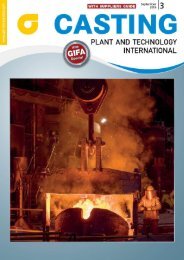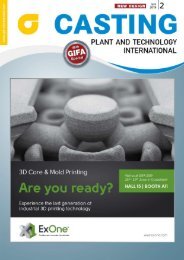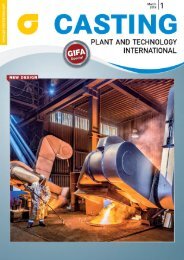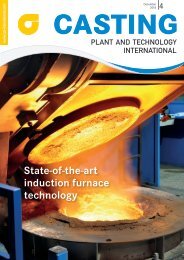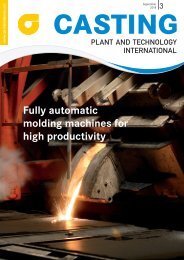CPT International 4/2019
You also want an ePaper? Increase the reach of your titles
YUMPU automatically turns print PDFs into web optimized ePapers that Google loves.
COMPANY<br />
team around Dr. Ioannidis was awarded<br />
the Innovation Prize of the German<br />
Foundry Industry – a prize for material,<br />
process or product development for<br />
companies or persons in the foundry<br />
sector. “We at Frech are proud that the<br />
German foundry industry, the leaders in<br />
Europe, selected us for the prize. The<br />
association represents our customers.<br />
This is a stimulus for our entire team,”<br />
Dr. Ioannidis assesses the award proudly.<br />
Frech passed on the 15,000 euro<br />
prizemoney to the BDG and the German<br />
Foundrymen’s Association (VDG)<br />
directly after being awarded it – to promote<br />
young up-and-coming talent. A<br />
small but richly symbolic step against<br />
the sector’s impending lack of skilled<br />
employees.<br />
The future offers much more<br />
And then – just at the end of our meeting<br />
in Schorndorf – Dr. Ioannidis<br />
majestically passes on some astonishing<br />
information that is really forward-looking:<br />
Frech is going to invest in the high<br />
double-digit millions to massively<br />
enlarge the Weiler site by 15,000 m² for<br />
a logistics center and two assembly halls<br />
for hot- and cold-chamber die-casting<br />
machines. This increases the production<br />
and commercial space to about 50,000<br />
m². He says that they also have new<br />
ideas, apart from the large-scale machines,<br />
for the Plüderhausen site. In addition,<br />
production capacity in Asia is to be<br />
increased with a new works for several<br />
million euros during the next two years.<br />
The message is clear: 70 years of history<br />
is not enough – the future offers much<br />
more for this successful German<br />
foundry supplier!<br />
www.frech.com<br />
From a small business to a global player<br />
Frech was founded in 1949 by engineer<br />
Oskar Frech, who initially produced<br />
tools with his wife in their home in<br />
Schorndorf. “It became time to expand<br />
when one day the spindle of a processing<br />
machine threatened to break<br />
through the ceiling,” relates Louis<br />
Braun, who has been working for Frech<br />
since the mid-1970s. The company’s history<br />
is reviewed on a wall about 50<br />
meters long. Frech only acquired its<br />
own company grounds in the Weiler<br />
suburb of Schorndorf – the current<br />
headquarters – two years after its founding.<br />
The first works expansion took<br />
place in 1958. At this time, about ten<br />
employees worked for the company.<br />
The first die-casting plant was put on<br />
the market in the early 1960s: a<br />
hot-chamber die-casting machine with a<br />
clamping force of ten tonnes, for materials<br />
such as tin, zinc and lead. In the<br />
days when Chancellor Ludwig Erhard,<br />
the cigar-smoking overseer of Germany’s<br />
economic miracle, ruled the republic<br />
the works in Weiler was expanded<br />
for the serial assembly of hot-chamber<br />
die-casting machines in 1963 – the starting<br />
signal for today’s success.<br />
Step-by-step the Schorndorf-based<br />
engineers appropriated other business<br />
segments: firstly, they launched a<br />
hot-chamber die-casting machine for<br />
magnesium in the late 1960s, then the<br />
first cold-chamber die-casting machine.<br />
They successfully entered the die-casting<br />
business themselves with the acquisition<br />
of Moneva in 1971. Frech thus got<br />
the opportunity to test its plant technology<br />
in practice. At about the same<br />
time, the first automation elements<br />
made their appearance in plant technology:<br />
“spraying equipment, removal<br />
devices and trimming presses came<br />
along,” Braun recalls. In addition, the<br />
newly founded Frech Leasing henceforth<br />
simplified financing of the machines.<br />
The number of employees rapidly<br />
rose to about 110 in the mid-1970s due<br />
to the construction of a new works in<br />
Schorndorf-Weiler with its own tool<br />
construction department. This is when<br />
the internationalization – driven by<br />
Wolfgang Frech after he took over from<br />
his father Oskar Frech in 1965 – also<br />
took off. A first subsidiary in France<br />
kicked off the setting-up of a global<br />
sales and service network that now<br />
includes large parts of the EU and Russia,<br />
as well as more distant markets such<br />
as Mexico, Southeast Asia, India, China,<br />
and the USA.<br />
<strong>International</strong>ization accelerated<br />
during the 1980s. The subsidiary in<br />
Shanghai had been founded by the end<br />
of the decade (and was later converted<br />
to an efficient production site in 2015).<br />
The Robamat subsidiary for producing<br />
tempering units was founded during the<br />
1990s, during which the joint venture<br />
Spesima GmbH in Bulgaria was also initiated<br />
for the automation of die-casting<br />
plants. Furnace constructor Meltec joined<br />
the Frech Group in 2000. The largest<br />
acquisition in the company’s history took<br />
place in 2007 with the take over of<br />
cold-chamber rival Müller Weingarten.<br />
The Group made a further important<br />
purchase – the Swiss vacuum technology<br />
company VDS – in 2013. Vacuum technology<br />
can be used to dispel air inclusions<br />
in castings, and thus optimize quality.<br />
44




